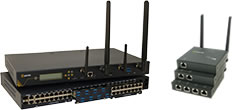
Emerging smart cars trends reflect the advantages of remote data management
By Max BurkhalterJanuary 27, 2016
The International Consumer Electronics Show (CES) provides an opportunity for big players in multiple industries to announce their most promising projects. At CES 2016, Toyota made waves by announcing that the company plans to equip consumer vehicles with a Data Communication Module (DCM), according to Digital Trends. This device will connect vehicles to the Toyota Big Data Center, where data received will be stored, analyzed and leveraged to improve efficiency and customer service. The Verge noted that Toyota's success in this field could set a major precedent for the rest of the car industry.
This new spin on remote data management reflects the many advantages of collecting information from multiple locations to generate more accurate results. As vehicles become more connected to the data center, and in some cases begin to operate like the data center, it's worth the time of IT professionals to take a second look at the value that can be created with effective remote data management. This overview also provides insight into the future of wireless vehicles.
Automated diagnostics speed up the maintenance process
Many consumers are already open to the idea of their vehicles expanding their functionality as mobile computers. A report published by IBM noted that nearly 60 percent of surveyed car buyers expressed interest in vehicles with self-diagnostic capabilities. Though the specifics of how Toyota plans to leverage remote data collection sent from vehicle DCMs to the carmaker's data center are still a mystery, there's a good chance that maintenance data and diagnostic feedback will be positioned as an added value of vehicles connected to the data center.
Companies managing remote data centers can take advantage of automated diagnostic reporting as well. With the strategic combination of a DCIM platform and remote console servers, network diagnostics for the entire company can be centralized at a single location. This arrangement alerts IT professionals of potential downtime immediately and limits the amount of travel that employees will have to undertake to perform troubleshooting.
"Remote data collection won't be limited to diagnostic information."
Remote data collection enhances analytics results
Toyota's use of remote data collection won't be limited to diagnostic information. According to USA Today, the car maker plans to utilize data collected by self-driving prototypes to meet their goal of creating a finished product by 2020. It's likely that Toyota's newly announced DCM technology will play an important role in this data collection. The more pertinent data Toyota is able to take in, the more accurate results the company can collect to rectify longstanding issues.
This approach also makes sense for data center operators. Companies that limit their analytics research by only including results from the main data center pass up a chance to create broader solutions. Successfully incorporating data collected from every facility performing storage duties via remote data management will make it easier for companies to refine their analytical results. RCR Wireless News emphasized that real-time analytics will be a major driving force in 2016, so data center operators that upgrade their analytics operations ASAP will find themselves ahead of the curve.
Wireless information sharing calls for tight security protocols
Reservations about data privacy may prove to be a hurdle for Toyota to overcome if the industry leader decides to equip every vehicle with DCM functionality. That's why the automaker promised at CES 2016 that any information traveling from vehicles to Toyota's data center will be protected by advanced privacy and security controls, according to Mashable.
The same concerns should occupy data center managers, but thankfully this problem is much easier to resolve in the data center. Selecting the right hardware, such as remote console servers packaged with reliable encryption options, will go a long way towards ensuring customer data transferred wirelessly does not fall into the wrong hands.

The cars of the future will function like miniature data centers.
Emergency scenarios can be managed via wireless connections
A function that Toyota has already mentioned will be added to wireless-capable vehicles is emergency response messaging. Airbag deployment will cause the vehicle to automatically alert the central data center and this emergency information is then forwarded to local emergency responders. Safety is a major priority for drivers and automakers alike, so both sides are likely to welcome this service as an advantage of cars and trucks equipped with DCMs.
A properly configured network can identify failure scenarios far quicker than IT professionals taxed by duties beyond data center maintenance. In the long run, solving this problem as soon as they arise will limit repeat maintenance and downtime scenarios in the future. In situations where regional data centers require approval from company headquarters to perform major data center repairs, real-time updates from remote data centers can help IT professionals make their case for why the problem must be fixed immediately.
Perle's wide range of 1 to 48 port Perle Console Servers provide data center managers and network administrators with secure remote management of any device with a serial console port. Plus, they are the only truly fault tolerant Console Servers on the market with the advanced security functionality needed to easily perform secure remote data center management and out-of-band management of IT assets from anywhere in the world.



